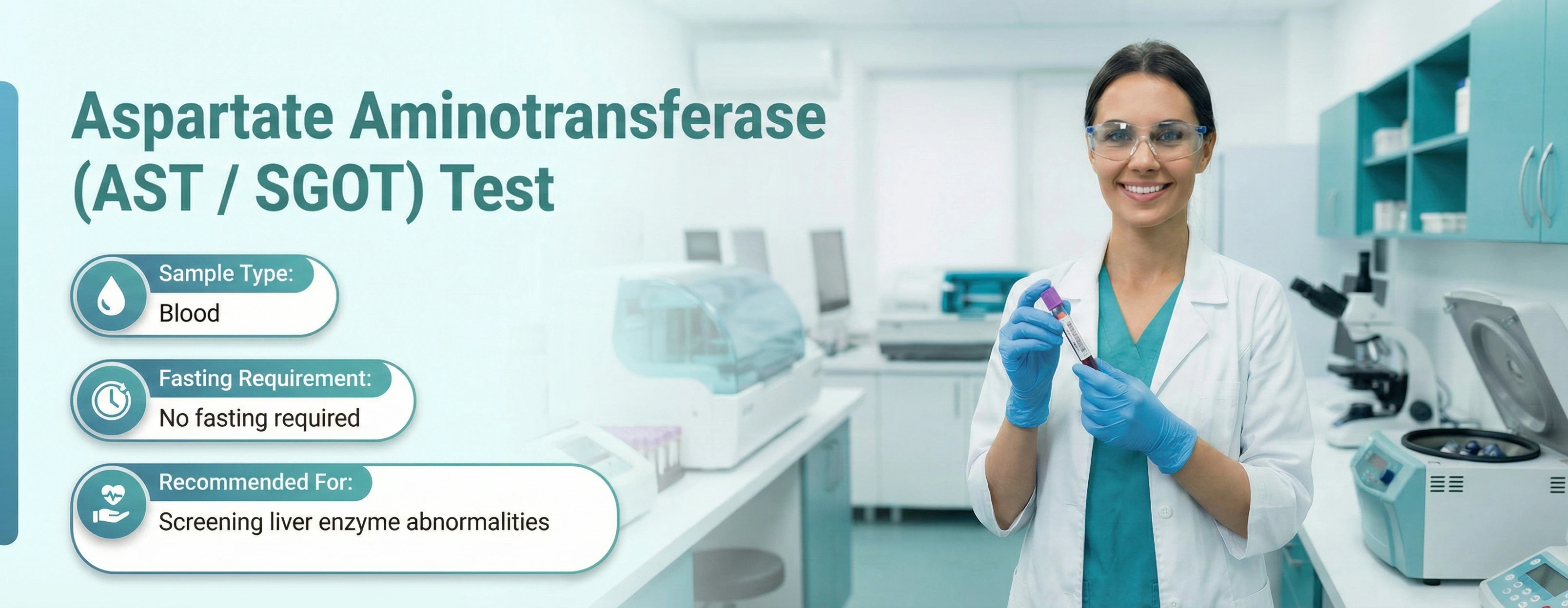574+ orders placed in your location
100% NABL & ISO Certified Lab • 100% Accurate Reports
Aspartate Aminotransferase (AST / SGOT) Test
Serum Glutamic-Oxaloacetic Transaminase Test, Aspartate Transaminase Test, SGOT Test, AST Test, Aspartate Aminotransferase Test
- SummaryThe AST (also known as SGOT) test measures the level of the AST enzyme in the blood, which is mainly found in the liver, heart, and muscles. It helps detect liver damage, heart disease, or muscle disorders. The test is done using a blood sample, and fasting is usually not required, although it may be advised if done with other liver function tests.Read more
- Reports Within10 HrsView Sample Report100% NABL & ISO Certified Labs
- SampleBlood
- AgeAll Age Group
- GenderMale and Female
- FastingNot Required
PharmEasy Promises
Know More About The Test
A quick info on SGOT test
Overview
The liver, the largest gland of the human body, is located on the right side of your abdomen. The liver helps in maintaining the body's metabolism by plenty of functions. The yield and production of bile from the liver are essential to carry out and excrete the waste product from the body. The liver clears the toxic substances, drugs or other poisonous substances and resists the development of infection.
The two most common enzymes to take the upper hand in liver functioning are:
- AST: Aspartate aminotransferase, also known as serum glutamic-oxaloacetic transaminase (SGOT)
- ALT: Alanine aminotransferase, also known as serum glutamate-pyruvate transaminase (SGPT)
AST test results and other liver function tests can help doctors screen, diagnose and monitor liver diseases effectively.
In accordance, the SGOT (AST) test, a liver function test, measures the AST or SGOT enzyme in the blood. Under normal conditions, low levels of AST are seen in the liver (majorly), muscular tissues, red blood cells, pancreas, kidney and heart. Whenever there is damage to these organs, specifically the liver, the amount of AST or SGOT enzymes markedly increases as they leak into the bloodstream and show up on the SGOT (AST) test reports. AST test is often conducted with due considerations of ALT levels too. Their ratio (AST:ALT) can help assess liver damage at a precise scale.
India faces the challenges and burden of liver disorders with an increasingly westernised lifestyle. A sedentary lifestyle, accumulation of fat, or chronic alcoholism are the causative agents behind the increase in liver diseases in India. The four stages of liver failure take the course of inflammation, scarring or fibrosis, cirrhosis and end-stage liver disease.
Consumptions of certain medications, biological agents like viruses and genetics are also linked with liver disorders. There is no cure for liver cirrhosis. SGOT (AST) test is used in the diagnosis of liver failure at an early stage. It not only prevents end-stage liver failure but also increases the chance of getting treatment with proven results.
Risk Assessment
Hepatitis, Liver cirrhosis, Liver carcinoma, Heart Attack
What does this test detect?
The liver contains both AST and ALT enzymes. Aspartate Aminotransferase Test, abbreviated as AST test, helps estimate the severity and prognosis of liver disease or failure. The SGOT (AST) test procedure catches an increase in AST enzymes in blood and reflects in the SGOT (AST) reports. If done along with ALT, it is an effective test to screen the outbreak of hepatitis (inflammation of the liver).
The SGOT (AST) tests can diagnose:
Liver-related abnormalities | Non liver-related abnormalities |
|
|
Indications for SGOT (AST) Test
An SGOT (AST) blood test is prescribed to those experiencing symptoms of liver dysfunction, like:
- Jaundice: Yellowish discolouration of eyes, skin and mucous membrane
- Excretion of dark-coloured urine and light-coloured stool
- Abdominal cramps, appetite loss and weakness
- Nausea, vomiting and diarrhoea accompanied by fatigue
- Accumulation of fluid and thus swelling of legs and abdomen
How frequently should you take this test?
An SGOT (AST) test can diagnose increased AST enzymes level in the blood. The specific testing frequency is not yet established. Doctors will only prescribe an SGOT (AST) test if abnormal signs and symptoms of impaired liver functions are present.
AST test is often evaluated along with other liver function tests and comprehensive metabolic panels (CMP). Commonly, an ALT test is recommended with an AST test as it is a more liver-specific enzyme. Consult your healthcare professional or the physician about the upcoming follow-ups, liver transplants and medications.
Test Preparation
Before the Test
Your doctor will most likely prescribe a liver panel along with an SGOT (AST) test. Here are some considerations you will have to take:
- If the AST test alone is being tested, you do not require to fast before the test.
- If the doctor prescribed other liver function tests along with AST, you need to undergo an 8-12 hour fast before the test.
- Inform your doctor about over the counter (OTC) medications, drugs, and any herbal supplements you currently are on.
During the Test
A nurse or phlebotomist will use your arm's vein to collect the blood sample.
After the Test
When done hygienically and according to protocol, the SGOT (AST) test procedure poses no serious threats to an individual.
Parameters
SGOT (AST) test reports indicate the extent of damage to liver cells. An AST test, when combined with ALT test and several other liver function tests, accounts for:
- Detection of any liver dysfunction
- Confirmation and establishment of a diagnosis
- Detection of the severity of liver damage
- For screening, monitoring, and prognosis of liver disease
SGOT (AST) test is one of the essential biochemical parameters of liver function tests (LFTs). Other biochemical parameters to assess the healthy functioning of the liver includes:
- Tests based on excretory function, like serum bilirubin, bile salts, etc.
- Tests based on the detoxifying function of the liver, like blood ammonia.
- Tests based on synthesis function, like plasma proteins and prothrombin.
- Tests based on enzymatic function, like AST, ALT and ALP tests.
- Metabolic function tests of the liver.
Ranges
Your healthcare professional will help you to understand the values. The normal range for the SGOT (AST) test are:
Age | Normal Range in units per liter (U/L) |
Adult Male and Female | 17-59 units/L |
Elderly | Slightly higher values than adult |
The normal range of SGOT (AST) test for Childrens are:
Age | Normal Range in units per liter (U/L) |
0-5 days year old | 35-140 units/L |
Less than 3 years old | 15-60 units/L |
3-6 years old | 15-50 units/L |
6-12 years old | 10-50 units/L |
12-18 years old | 10-40 units/L |
Your doctor will inform you about the medications that might cause elevated AST levels. They are:
- Statins
- Barbiturates
- Herbal supplements
- Human immunodeficiency virus medications
Values vary from laboratory to laboratory. No AST level is considered “normal” to all. Your healthy AST might change as you age, exercise, modify your lifestyle, race, sex, etc. In addition, Strenuous exercising, muscle trauma, Vitamin A overdose can cause increased levels of SGOT (AST) than normal ranges and pregnancy decreased levels.
The normal values and reference ranges of the test may vary from lab to lab. Please refer to the ranges mentioned in the report and consult a doctor to understand the interpretation of lab reports.
Test Result Interpretation
The SGOT (AST) test results can help yield information about rising levels of aspartate aminotransferase in an individual irrespective of age and gender. Interpretation of AST levels goes as follows:
Very high AST levels than the normal range
An excessively high AST report, i.e., ten times higher than typical values can indicate any of the following severe liver diseases:
- Acute viral hepatitis (inflammation of the liver)
- Liver intoxication due to drug overdose, especially acetaminophen
- Liver cirrhosis, i.e., irreversible scarring and fibrosis of liver tissue
- End-stage liver failure
- Tumour necrosis
Moderately high AST levels than the normal range
Moderately high AST levels can help the doctor diagnose liver conditions like:
- Cholestasis: A decreased flow of bile from the liver
- AST can also rise in heart attack and failure
- Muscle trauma
- Muscular dystrophy: Progressive loss of muscle mass leading to weakening of the body
- Pulmonary embolism
Slightly raised levels of AST than the normal range
It is believed that persistent and slightly elevated levels of AST and ALT causes more harm than one-time raised AST levels. Chronic alcoholism is the primary cause behind the slow and continuous rise of liver enzymes in the blood. It can lead to the diagnosis of:
- Liver cirrhosis
- Infectious Mononucleosis: An infectious disease that spreads via saliva, also known as kissing disease
There are other considerations to keep in mind while interpreting the results of SGOT (AST) levels. High AST levels alone might not prove out to be a specific diagnostic marker for liver diseases. There are cases observed where patients with Hepatitis C showed normal AST levels. Since the ALT enzyme is more liver-specific, one should measure AST levels and ALT levels simultaneously.
Other important interpretations are as follows:
Liver-related conditions | Interpretation |
No liver abnormality |
|
Alcohol-induced liver disease | AST:ALT ratio equal to or greater than 2 |
Acute hepatitis | High AST levels for 1-2 months, and sometimes even 3-6 months |
Chronic hepatitis | AST levels are not usually high |
Hepatitis C | AST levels might be normal, but high ALT levels |
Pregnancy | Decreased AST levels |
Price/Cost
The pricing for an SGOT test can vary based on the city and the laboratory. Typically, the cost of an SGOT test ranges from INR 169 to INR 439. Here is a detailed breakdown of the average charges for an SGOT test in various major cities across India:
City | Min Price | Average Price | Max Price |
SGOT Test Price in Bengaluru | 169 | 304 | 439 |
SGOT Test Price in Chennai | 169 | 304 | 439 |
SGOT Test Price in Delhi | 169 | 304 | 439 |
SGOT Test Price in Hyderabad | 169 | 304 | 439 |
SGOT Test Price in Kolkata | 169 | 304 | 439 |
SGOT Test Price in Lucknow | 169 | 304 | 439 |
SGOT Test Price in Mumbai | 169 | 304 | 439 |
SGOT Test Price in Nagpur | 169 | 304 | 439 |
SGOT Test Price in Patna | 169 | 304 | 439 |
SGOT Test Price in Pune | 169 | 304 | 439 |
Risks and Limitations
The SGOT (AST) test is a conventional blood test that is unlikely to trigger complications. But contact your physician immediately if you experience the following problems:
- Continuous bleeding from the needle insertion site.
- Pain or swelling at the site of blood collection.
Limitations of the test
- Intervention in the outcomes of tests by errors from the equipment or humans.
- Wrong understanding of the markers.
Was This Test Information Helpful?
Please rate your experience
References
Health packages containing 'Aspartate Aminotransferase (AST / SGOT) Test'
People Also Ask
What is SGOT and SGPT in blood tests?
What causes high SGPT and SGOT?
Is SGPT 70 normal?
Is the SGPT level of 75 bad?
What is the price of the SGOT test?
Have any doubts? Ask us.
Ask us anything about the Aspartate Aminotransferase (AST / SGOT) Test to understand it better
We provide trusted, expert-curated health content to support better awareness,prevention, and care.
Backed by experienced doctors, medical experts, and strict editorial standards.


